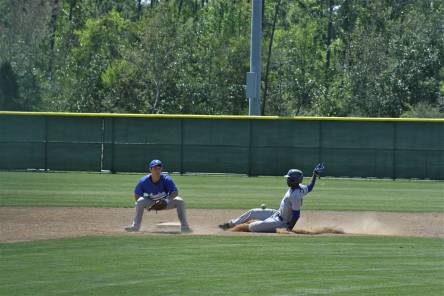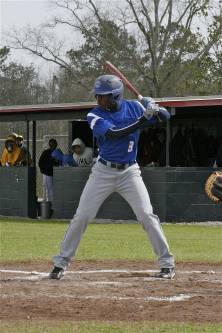
D.J. Davis has made a habit of sliding into second base well ahead of catchers' throws, and that ability has catapulted him into the discussion of first-round draft picks.
Photo courtesy of Audrey Davis
of
Stone (Wiggins, Miss.) loves to cut the grass. So much so that he does it as a summer job. So much so that even after a long day at work, he has been seen cutting lawns in his neighborhood for free.
"It's relaxing," Davis said. "I just ride along and think about my game and how I can get better."
Getting better is something Davis has done quickly his senior season, so much so that the three-year starter went from receiving zero Division I scholarship offers at the beginning of the season to being considered as one of the top outfielders in the upcoming MLB Draft. Some experts predict the centerfielder will be off the draft board by the end of the first round.
And it's all centered around one area of his game.

D.J. Davis, Stone
Photo courtesy of Audrey Davis
"It was definitely his speed that caught the attention of the pro scouts," Stone coach Kevin Conard said. "I had one pro scout tell me there are only a handful of players in the major leagues right now who are faster than D.J. No doubt that's what started all the attention he's getting. And then once the scouts saw him shag some fly balls and hit, they noticed he had some other skills to go along with his speed."
The 6-foot, 179-pound left-handed batter hit .373 with seven home runs and 27 RBIs, while compiling an .836 slugging percentage for the Tomcats (15-11), who were eliminated in the first round of the Mississippi Boys 5A State Tournament by eventual champion Pascagoula.
"Patience," Davis said of what makes him a good hitter.
Along with the patience came personal instruction. Unlike most players this day and age, Davis never played travel ball. Instead, he relied on the individual instruction of a former minor league player who he happened to know very well – his father, Wayne Davis.
"Travel ball would have taken away from our one-on-one time," said Wayne, who played in Toronto's minor league system. "D.J. has an uncanny ability in that if you talk to him or show him a technique, he can remember it and work on it. He catches on really easy."
Conard said Davis really matured physically between his freshman and sophomore years, but it wasn't until this past summer when Davis turned from a good player into a great one.
It all started at the East Coast Professional Baseball Showcase, where Davis ran an event-best 6.38 seconds in the 60-yard dash. He then showcased his bat and blinding speed in October at the World Wood Bat Association fall championship, where he swiped a tournament-leading five stolen bases while batting .375. His success at the plate and on the base paths carried over to the spring season, when Davis reached base at a .558 clip and stole 24 bases in 25 attempts.
"Things really clicked for him at the plate and he was able to get on base and then create things for us on the base paths," Conard pointed out.
Ironically, despite his unquestionable speed, it was Davis' power that might have raised his draft stock the most when he launched two long home runs against Richton in front of an estimated 50 pro scouts.
"The first went over 330 feet to right field," Davis recalled. "And the second was over 400 feet to dead center."
It was performances like those that make Davis a likely very high draft pick. But unlike most draft picks' parents, who waver whether to attend college or sign a pro contract, there's no question which way the Davis family is leaning.
"Having played in the minors myself, if the money is right, I'm going to tell him to sign a contract," his father said. "In the pros you will get a whole different world of training and a lot more at-bats. He'll get more at-bats in a half season as a rookie than a junior in college will have gotten at that point in his college career. But if it doesn't work out, we'll play a year of college baseball (Meridian Community College) and see how things go from there."
Conard said that no matter where Davis plays at the next level, the biggest adjustment will be facing better competition.
"We don't see pitchers who throw in the 90s very often," Conard explained. "So he's going to have to work on the things he hasn't been exposed to. The game gets faster at the next level, but that goes for every kid who advances on."
If Davis does advance to the pros, he'll be the first player to do so during Conard's 10-year tenure, and the coach said it couldn't happen to a nicer guy.
"He is the most level-headed, humble kid I've ever been around," Conard said. "To him, every day is just another day. No matter what's going on or who is at the park watching him, he's just another one of the guys. He doesn't separate himself from his teammates. He actually shies away from the glory. He's a real team guy.
"I've never coached or played with a kid who would have handled what he went through this year better than he did. He did what he's always done – just showed up and played as hard as he could."
And no matter where he shows up next year, he'll do the same.
"I'm just ready to play at the next level," Davis said confidently. "It doesn't matter where."
Jon Buzby is the sports columnist for the Newark Post, a freelance writer, and on the broadcast team for the 1290AM The Ticket High School Football and Basketball Games of the Week. You can reach him at jonbuzby@hotmail.com.
